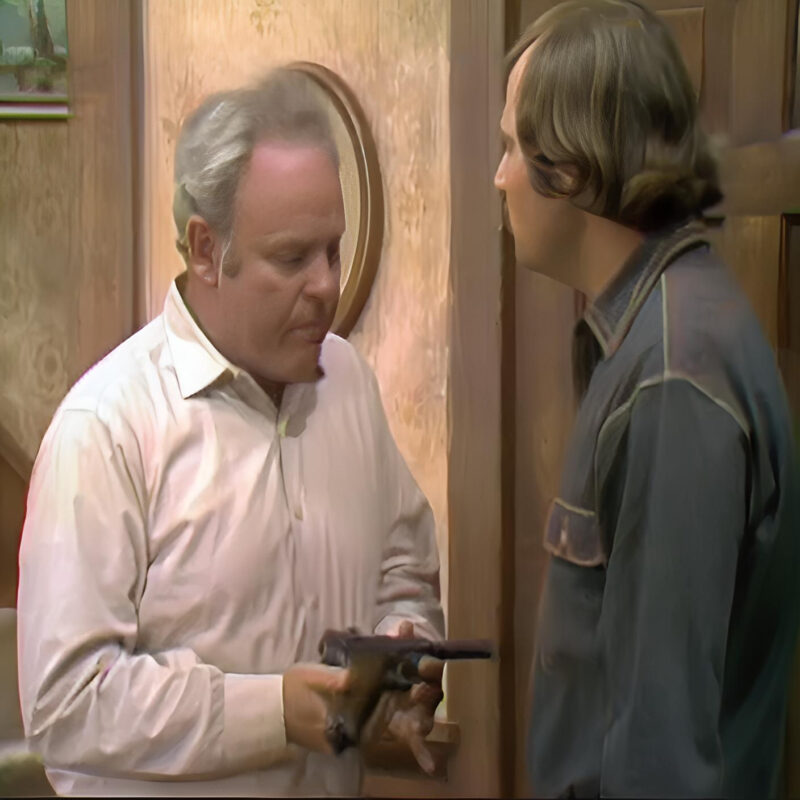
LOS ANGELES — Fifty years ago, the United States seemed on the verge of tearing apart over political differences. The civil rights movement, the sexual revolution, and the Vietnam War were causing rifts in neighborhoods and families, and violence was thick in the air. Amidst this turmoil, Americans were also getting accustomed to a pervasive form of technology: television. By the late 1960s, TV was still seen as an escape from reality rather than a medium for enlightenment. Popular shows like “The Andy Griffith Show” and “The Lucy Show” avoided references to current affairs, providing gentle, comedic relief instead.
However, the landscape of television quickly shifted. The top-ranked show in 1968-69 was “Rowan and Martin’s Laugh-In,” a variety show that boldly addressed sex, politics, and religion with rapid-fire jokes. This paved the way for a show that would transform TV forever: “All in the Family.” This socially conscious sitcom, which became enormously popular, featured central characters who argued about presidential politics, racial integration, and many other hot topics of the time.
The kind of national catharsis delivered by “All in the Family” seems elusive today. In 2018, we are still grappling with the impact of the internet, which fosters short-attention-span solitariness rather than family discussions and the reflective moments that a 30-minute TV program could offer. Social media has replaced television as the primary medium for public discourse, playing a significant role in the controversy surrounding ABC’s reboot of “Roseanne,” which seemed poised to be the modern-day equivalent of “All in the Family.”
“All in the Family” was widely praised by critics and won 22 Emmy awards during its 1971-79 run. Yet, some objected to the racial slurs and other vulgarities uttered by the main character, Archie Bunker, brilliantly portrayed by Carroll O’Connor. Archie was a complicated character, whose racism stemmed from a desire to use any advantage, including white privilege, to help his family. This was “motivated not by hatred but by fear,” as creator Norman Lear once wrote. Lear and O’Connor didn’t just ridicule Archie’s racism; they examined its causes, making Archie a living ethics exam problem for viewers.
One critic, Laura Z. Hobson, argued that “All in the Family” sanitized bigotry by avoiding the most offensive racial slurs, contending that you can’t portray a bigot as lovable. Lear responded by highlighting that many people grew up with loved ones who were also bigoted, making Archie’s character more relatable and authentic.
In 2014, The New Yorker’s Emily Nussbaum credited “All in the Family” for awakening a TV audience numb from shows like “The Brady Bunch” but warned about viewers who unironically embraced Archie. This issue resurfaced with Donald Trump’s presidency, making critics uncomfortable with flawed sitcom protagonists.
The socially conscious sitcom thrived in the ’70s, with shows like “Maude,” “Good Times,” “Barney Miller,” and “WKRP in Cincinnati.” However, they fell out of fashion with the rise of feel-good family sitcoms like “The Cosby Show” and “hangout” sitcoms like “Seinfeld.” But the genre has seen a mini-revival, reflecting today’s political divides. Shows like Netflix’s “One Day at a Time” tackle issues like immigration and gender identity, while CBS’s reboot of “Murphy Brown” aims to address current political differences.
One recent show that came close to recapturing the spirit of “All in the Family” was NBC’s “The Carmichael Show,” which explored racial and intergenerational issues but struggled to find a large audience. Meanwhile, ABC’s reboot of “Roseanne” initially drew huge audiences but was canceled due to racist tweets by its star, Roseanne Barr.
The performed-before-a-live-studio-audience sitcom remains one of the few places where viewers can collectively engage with serious issues in a humorous context. Sitcoms like “Black-ish” address current events and racial injustice but often portray their characters as inspirational figures rather than moral puzzles. In contrast, “Roseanne” tackled complex social issues and resonated with audiences during the Trump era, despite the controversy surrounding its lead actress.
Today’s single-camera sitcoms often explore important social issues but lack the cathartic and communal experience provided by live-audience shows. As television continues to evolve, the challenge remains to create socially conscious comedies that can unite audiences and provoke meaningful discussions, much like “All in the Family” did decades ago.
Essential Social Sitcoms
Here are 10 sitcoms that, at least occasionally, addressed political or social issues in a funny and organic way, from racism and economic mobility to L.G.B.T. rights and environmentalism. This list is limited to “theater-style” comedies.
- “All in the Family”
- “Maude”
- “Good Times”
- “Barney Miller”
- “WKRP in Cincinnati”
- “One Day at a Time” (Netflix revival)
- “Murphy Brown” (original and revival)
- “The Carmichael Show”
- “Black-ish”
- “Roseanne” (original and revival)
